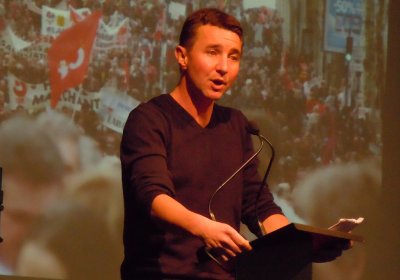I met Ali (not his real name) on my third visit to the children’s detention centre at the Melbourne Immigration Transit Authority (MITA) in Broadmeadows. Ali is a 16-year-old artist from Afghanistan. He has been held in Australian detention for five months — three months on Christmas Island and two months in Broadmeadows.
870
The New Anti-capitalist Party (NPA) held its congress in the Paris suburb of Montreuil over February 11-13.
The congress adopted by a large majority a document, Our Responses to the Crisis, which analyses the multiple crises gripping capitalism: economic, social, food and climate, and outlined a vision of anti-capitalist, ecosocialist politics.
WikiLeaks has announced it will pursue legal action against disgruntled former employee Daniel Domscheit-Berg, whose recently released book, Inside WikiLeaks, slams Julian Assange's leadership and character in a series of allegations.
Some of the allegations appear serious. Others are hopelessly trivial.
Iraq: Protesters met with bullets
“Soldiers and riot police fired on citizens rallying for jobs, public services and clean government across occupied Iraq,” the British Morning Star said on February 25. The article said at least 13 civilians were killed and many more wounded.
Thousands of workers took to the streets in Baghdad, Mosul, Ramadi, Basra, Fallujah and Tikrit despite a curfew.
If you have consulted Karl Marx for an answer to the recent global economic crisis, you are not alone. Google has confirmed the popularity of Marx’s writings is booming as people around the world try to make sense of increasingly harsh economic conditions.
The phenomenon was reported in an article posted at Time.com by Rana Foroohar, who said: “I consulted Google to see if the term ‘Marxism’ was trending upward. It was and has been ever since the end of December.”
About 200 people rallied in Brisbane's King George Square on February 25 to show solidarity with the people of Libya resisting the oppressive regime of Muammar Gaddafi. A banner proclaiming "Free Libya" was fixed to a wall, together with photos of victims of the Libyan military and police.
Placards carried by members of the Libyan community, many of them students, read "Stop using mercenaries to kill our people" and "Please help our country".
Forty-five pro-democracy activists, students and trade unionists were arrested in Harare on February 19 at a meeting to discuss the uprisings in Egypt and Tunisia.
On February 23, the activists were charged with treason, which risks the death penalty.
It is believed that security forces loyal to President Robert Mugabe’s ZANU-PF infiltrated the meeting at the Labour Law Centre in Harare, which was themed “Revolt in Egypt and Tunisia: What lessons can be learnt by Zimbabwe and Africa?”
The national and state elections results for the Rail Tram and Bus union (RTBU) have been partially counted.
In New South Wales, the incumbent right-wing Labor leadership team, called Unity, was challenged by Members Voice, a broad united front of those who advocate increased funding and staffing, and a clear strategy to reverse privatisation. This was the first challenge to the incumbents since the 1980s.
Popular uprisings in the Arab world have challenged a political landscape dominated by undemocratic regimes and fronted by dictators, a panel of academics and journalists said at a Sydney University forum on February 15.
Speakers discussed the regional and international ramifications of the uprisings in Tunisia and Egypt as part of the forum on people's power and change in the Arab world.
In 1987, I visited Libya as a journalist for the left-wing newspaper Direct Action. I visited Gaddafi’s bombed-out home — attacked by the United States one year earlier.
In the 1980s, the Gaddafi regime came under attack from the US government because it took an anti-imperialist line and gave financial and material aid to many national liberation movements at the time.
The article below is based on a December 16 speech by Canberra-based freelance historian Humphrey McQueen. McQueen spoke at a Canberra rally organised to defend WikiLeaks and its editor-in-chief Julian Assange.
* * *
By what right are we here today? Why are we confident that we can protest and not be shot at by the political police on the fringes of this crowd?
We take it for granted that we won’t be arrested as we leave. We do not expect to lose our jobs by speaking out for WikiLeaks.
Tasmanian Greens leader and state corrections minister Nick McKim has come under fire from unions after he stood down 56 guards at Risdon prison without pay on February 21.
McKim brought in police officers as scabs to replace the guards. The prison has been in partial lock-down due to the lack of staff.
McKim said he stood down the guards because they were preparing to take industrial action.
- Previous page
- Page 3
- Next page





